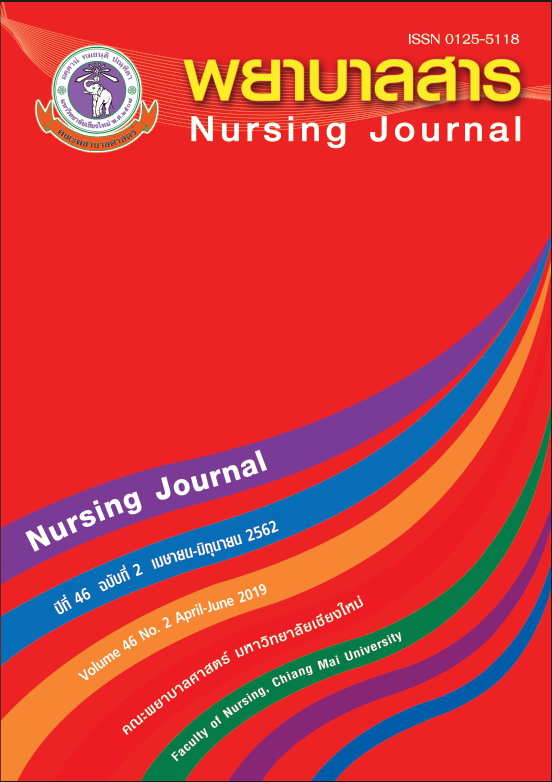Anxiety, Social Support, and Postpartum Functional Status Among Mothers with Cesarean Section
Keywords:
Maternal functional status, anxiety, social support, cesarean mothersAbstract
Attainment of maternal functional status during the postpartum period is very important for maternal health, especially cesarean mothers. The purpose of this descriptive correlational research study was to explore the relationship between anxiety, social support, and postpartum functional status among mothers with cesarean sections. The subjects were 102 cesarean mothers at 6 weeks postpartum who received service at Rajavithi Hospital, between August 2014 and January 2015. The research instruments used were the State Anxiety Inventory Form Y by Spielberger (1983), the Thai version by Thapinta (1991) with a reliability coefficient of .89, the Mother Social Support Questionnaire by Sitthiboonma, and others (2014) with a reliability coefficient of .94, and the Maternal Functional Status Inventory by Baosoung, and others (2014) with a reliability coefficient of .94. Data were analyzed using descriptive statistics and Pearson's product moment correlation. Results of the study revealed that:
- Fifty-six point eight six percent of cesarean mothers had a low level of state anxiety.
- Most of cesarean mothers (79.42%) had a high level of social support, and most cesarean mothers (84.31%) identified that the husband was the most supported person.
- A majority of cesarean mothers (90.20%) had a high level of maternal functional status.
- Anxiety had a significant and moderate negative correlation with maternal functional status among mothers with cesarean sections (r = -.503, p < .01).
- Social support had a significant and moderate positive correlation with maternal functional status among mothers with cesarean sections (r = .385, p < .01).
References
Aktan, N. (2012). Social support and anxiety in pregnant and postpartum women: A secondary analysis. Clinical Nursing Research, 21(2), 183-194.
Avant, K.C. (1981). Anxiety as a potential factor affecting maternal attachment. Journal of Obstetric, Gynecologic, & Neonatal Nursing, 10(6), 416-419.
Baosoung, C., Sansiripun, N., & Tiansawad, S. (2014). Postpartum Maternal Functional Status Inventory. Faculty of Nursing, Chiang Mai University, Chiang Mai, Thailand. (In Thai).
Fawcett, J., Tulman, L., & Myers, S. (1988). Development of the inventory of functional status after childbirth. Journal Nurse Midwifery, 33, 252-260.
Herguner, S., Cicek, E., Annagur, A., Herguner, A., & Ors, R. (2014). Association of delivery type with postpartum depression, perceived social support and maternal attachment. The Journal of Psychiatry and Neurological Sciences, 27(1), 15-20.
House, J.S. (1981). Work Stress and social support. Menlo Park: Addison-Welsley.
Hung C.H. (2004). Predictors of postpartum women’s health status. Journal Nursing Scholarship, 36(4), 345-351.
Hung, C.H. (2007). The psychosocial consequences for primiparas and multiparas. Kaohsiung Journal of Medicine Science, 23(7), 352–360.
Lobel, M., & DeLuca, R.S. (2007). Psychosocial sequelae of cesarean delivery: Review and analysis of their cause and implications. Social Science & Medicine, 64, 2272-2284.
McVeigh, C. (1997). Functional status after childbirth: A comparison of Australian woman from English and non-English speaking backgrounds. Australian College of Midwives Incorporated Journal, 10, 15-21.
McVeigh, C. (1998). Functional status after childbirth in Australian sample. Journal of Obstetric, Gynecologic, and Neonatal Nursing, 27(4), 402-409.
McVeigh, C. (2000a). Satisfaction with social support and functional status after childbirth. American Journal of Maternal Child Nursing, 25(1), 25-30.
McVeigh, C. (2000b). Anxiety and functional status after childbirth. Australian College of Midwives Incorporated Journal, 13, 14-18.
Mercer, R.T. (1986). First-time motherhood: Experiences from teens to forties. Springer Publishing, New York.
Negron, R., Martin A., Almog, M., Balbierz, A., Balbierz, A., & Howell, E. A. (2012). Social Support during the Postpartum Period: Mothers’ Views on Needs, Expectations, and Mobilization of Support. Maternal Child Health Journal, 17(5), 616–623.
Ozkan, S., & Sevil, U. (2007). The study of validity of inventory of functional status after childbirth. TSK Koruycu Hekimlik Bulteni, 6(3), 199-208
Polit, D.F. (2010). Statistics and data analysis for nursing research (2 nd ed.). New Jersey: Pearson Education Inc.
Posmontier, B. (2008). Functional status outcomes in mothers with and without postpartum depression. The Journal of Midwifery and Women’s Health, 53(4), 310-318.
Sanli, Y. & Oncel, S. (2014). Evaluation of functional status of women after their delivery of child factors effecting it. Journal of Turkish Society of Obstetric and Gynecology, 11,195-204.
Schmied, B., & Everitt, L. (1996). Post-natal care: Poor cousin or priority area? In L. Barclay, & L. Jones (Eds.), Midwifery: Trend and practice in Australia. Melbourne: Churchill Livingstone.
Sitthiboonma, N., Kantaruksa, K., & Supavititpatana, B. (2014). Stress, social support and postpartum depression among primiparous mothers. Thesis of master of nursing science (advanced midwifery). Chiang Mai University, Chiang Mai, Thailand. (In Thai).
Sittipa, K., Baosoung, C., Sansiriphun, N. (2017). Anxiety, social support and postpartum functional status among first-time mothers. Nursing Journal, 44(3), 30-40. (In Thai)
Spielberger, C.D. (1983). Manual for the state-trait anxiety inventory. (STAI) form Y: Self-evaluation questionnaire. Palo Alto, CA: Consulting Psychologists Press,
Spielberger, C.D., & Sydeman, S.J. (1994). State-trait anxiety inventory and state-trait anger expression inventory. In M.E. Marvish (Ed.). The use of psychological test for treatment planning and outcome assessment (pp.292-321). Hillsdale: LEA.
Shives, L. R. (2008). Basic concepts of psychiatric-mental health nursing. Philadelphia: Lippincott Williams & Wilkins.
Thapinta, D. (1992). Reducing the anxiety of staff nurses who care for AIDS patients by changing their mindset and mindfulness practice. (Unpublished Dissertation). Chulalongkorn University, Bangkok, Thailand. (In Thai).
Tulman, L., Fawcett, J., Groblewski, L., & Silverman, L. (1990). Changes in functional status after childbirth. Nursing Research, 39, 70-75.
Downloads
Published
How to Cite
Issue
Section
License
บทความที่ได้รับการตีพิมพ์เป็นลิขสิทธิ์ของวารสารพยาบาลสาร
ข้อความที่ปรากฏในบทความแต่ละเรื่องในวารสารวิชาการเล่มนี้เป็นความคิดเห็นส่วนตัวของผู้เขียนแต่ละท่านไม่เกี่ยวข้องกับมหาวิทยาลัยเชียงใหม่ และคณาจารย์ท่านอื่นๆในมหาวิทยาลัยฯ แต่อย่างใด ความรับผิดชอบองค์ประกอบทั้งหมดของบทความแต่ละเรื่องเป็นของผู้เขียนแต่ละท่าน หากมีความผิดพลาดใด ๆ ผู้เขียนแต่ละท่านจะรับผิดชอบบทความของตนเองแต่ผู้เดียว






